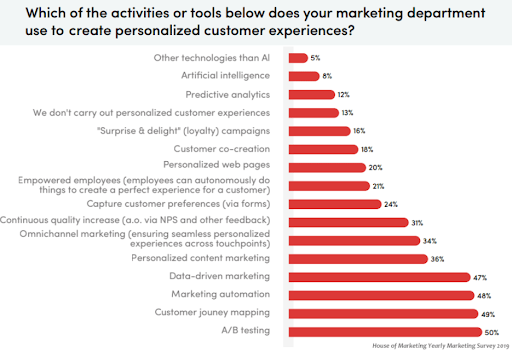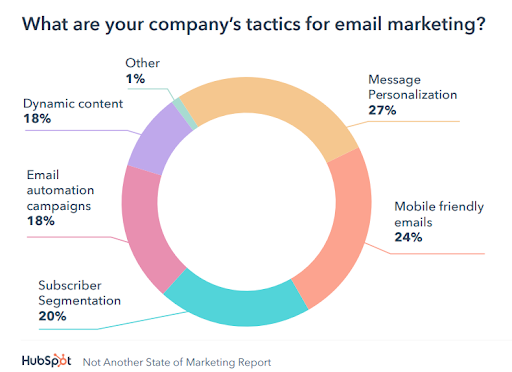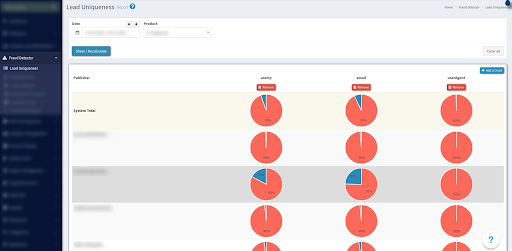What Is Marketing Automation and Why Do You Need It?
The use of marketing has significantly evolved over the years. Marketing is no longer empowering only businesses. Today, it’s all about the needs of consumers and how they shape marketing decisions and products.
The rise of inbound and data analytics disrupted the global digital marketing industry. From that moment on, traditional marketing practices were no longer effective or competitive. Instead, it all came down to empowering consumers, understanding their behavior, and tracking their activities.
The behavior of potential customers is now in the spotlight, and marketing automation is what brands need to create a holistic picture of their prospects.
What Is Marketing Automation and Why Do You Need It?
The behavior of potential customers is now in the spotlight, and marketing automation is what brands need to create a holistic picture of their prospects.
Whether you’re new to the digital marketing industry or looking to automate your marketing efforts, this guide will help you capitalize on marketing automation, save time and money on repetitive action, and fine-tune your lead management process.
Marketing Automation Explained
It’s no secret that brands have similar goals. They’re looking to increase revenue, accelerate business growth, optimize investments, improve retention, and personalize customer experiences. The latter is what brands struggled with the most because it meant turning the mic over to their clients.
Among other things, marketing automation has been one of the top five tried and true methods used to deliver personalized experiences to consumers.

Source: EmailMonday “The Ultimate Marketing Automation Stats”
However, each of the goals brands are pursuing consists of a series of challenges like streamlining processes, investing in specific technologies and solutions, or aligning the work of sales and marketing departments. That’s precisely what marketing automation solutions offer today.
But before we get into that, let’s start with a short and clear definition.
What is Marketing Automation?
Marketing automation is a process of simplifying, automating, and measuring repetitive marketing and sales tasks. It helps small businesses and large-scale enterprises streamline their email marketing, accounting, and lead generation processes and implement tracking and distribution solutions that deliver valuable data for strategic marketing decisions.
In a nutshell, marketing automation is designed to eliminate human error and simplify the complexities of data. In fact, Oracle states that automation solutions can drive around a 14.2% increase in sales productivity and a 12.2% decrease in marketing overhead.
When used effectively, marketing automation can solve any business problem, help execute numerous campaigns across different channels, and reduce costs.
Save Time And Money On Repetitive Actions
Customer experience has become synonymous with business growth. As the number one growth driver, it also calls for the transformation of the digital environment and relationships with clients.
Many marketing and sales experts today are overworked. That’s why it’s even more challenging when dealing with routine tasks like streamlining the customer acquisition process, tracking engagement, and winning back lost leads, to name a few.
Whether you’re in B2B, B2C, or hybrid business, marketing automation can assist with solving the most intractable problems. For instance, with Phonexa’s all-in-one solution for calls, leads, clicks, email, SMS, accounting, and more, businesses can aggregate and analyze critical data, engage prospects, keep a close eye on the customer journey, and optimize their efforts.
Let’s take a closer look at some common issues that automation solutions and tools can effectively resolve.
Nurture & Extend Relationships With Prospects
Around 20% of prospects are not ready to buy right away. In other words, they require effective nurturing tactics, a.k.a. dozens of additional touchpoints across multiple channels, to become sales-ready.
There’s no denying that dealing with leads that aren’t converting can be frustrating. But with marketing automation at hand, the problem can be easily fixed.
Here’s how implementing marketing automation solutions can help with lead nurturing.
1. Decrease the workload of your marketing and sales experts and improve their performance by replacing repetitive manual tasks with automated campaigns and rules.
2. Remember the importance of behavioral segmentation to keep every stage of your lead nurturing program relevant to a specific audience.
3. Assess the sales cycle your leads have to go through before making a purchase and ensure it’s not too long.
4. Choose automation tools that allow cutting costs through integration opportunities.
5. Determine your goals and then set up and launch lead nurturing campaigns that are triggered by predetermined criteria.
6. Gain actionable insights into your marketing efforts from every call, lead, email, or keyword and increase conversion rates.
It’s worth mentioning that your work is far from finished once a prospect becomes your customer. At the end of the day, brands can only drive real value by strengthening these relationships over time, which implies selling more, driving loyalty, and achieving a high retention rate.
Refine Your Approach To Investment
It’s crucial for marketing, sales, and executive teams to see the results of every invested dollar. That’s only fair since brands need to see the actual impact of marketing campaigns on revenue growth.
Here’s how marketing automation helps businesses measure and assess every marketing activity accurately:
- Record and leverage every piece of your marketing information
- Measure your marketing efforts and run A/B tests
- Test campaign strategies before you implement them
- Generate comparison reports in real-time for effective optimization and higher ROI
- Check your funnel for leaks and evaluate their impact on your conversion rate, revenue, and ROI
- Integrate a marketing automation solution with your current tech stack to get a complete view of the customer journey
Fine-Tune Your Email Marketing
Gone are the days when marketing automation was only associated with emails.
Sure, email marketing has been around for quite a while. But with the changing digital environment and customer-centricity on the rise, marketers keep struggling with targeting, deliverability, and engagement – its primary metric.
Simply put, the continuous prevalence of email marketing doesn’t make it easy for brands to succeed with it.

Source: HubSpot “Not Another State of Marketing Report”
Today, breaking free from outdated email marketing tactics is what brands need to do to see prospects’ behavior in numerous campaigns, create compelling content, and effectively nurture and push them towards action.
What does it mean for marketers? Let’s start by establishing how automation tools can impact your email marketing efforts.
Valuable information, personalized messages, and long-term relationships lie at the heart of email marketing. That’s why marketing experts use various methods to capture the attention of prospects and additional information about them, including their interests, specific behavior patterns, or buying cycles.
Implementing a marketing automation solution and integrating it with your current tech stack is a surefire way to effective communication with your prospects, nurturing workflows, better email list segmentation, and much more.
But before considering ways to automate emails, brands need to consolidate as much information about their prospects as possible. Some automation solutions allow killing two birds with one stone. In other words, businesses can build personas and get a solid understanding of who their clients are, what triggers their interest, and how they assess the problem-solving process.
The best part of automating your email marketing is that everything – literally, everything – can be tracked, which makes the segmentation and reporting processes easy as pie.
Let’s look at several examples of how businesses use email automation to drive engagement and boost sales.

Source: Grammarly
The period of big sales typically starts shortly before the specific holiday season. That is a classic example of how brands use special dates or occasions to sweeten the deals with incentives and convince prospective clients to buy their products.

Source: Bobbi Brown
The target audience of this email newsletter is interested one-time clients. It demonstrates part of the brand’s nurturing program that offers additional incentives. By understanding how leads interact with your emails, tracking their behavior on your website, and identifying the needs of each persona, brands can get granular with their segmentation.
In a nutshell, that’s how businesses create opportunities for interactive engagement, deeper conversations, better conversions, and meaningful relationships.
Get Insights And Value From Every Lead
The first thing you need to remember about marketing automation is that you’re just playing a guessing game without it.
To succeed, every marketer needs three things: statistics, statistics, and more statistics. While leads prefer to learn at their own pace and be reached when they’re ready to make purchase decisions, marketers need to have a well-constructed strategy to put it into practice.
Implementing effective lead management and distribution system is crucial for every business.
Not to exaggerate, but without a lead management system in place, brands can’t launch cost-effective campaigns to generate traffic, drive leads, nurture them, and close new deals.
Here’s the thing: businesses need actionable insights to create profitable and efficient campaigns. That’s only possible with specific lead management features like analytics and tracking. Luckily, many automation solutions offer it as part of their marketing suite.
Let’s take a closer look at what a lead management system has to offer and how it can help your business succeed.
- Follow your leads: Lead tracking feature helps brands identify traffic sources and understand campaign effectiveness through duplicate lead percentage and number of sold leads.
- Tap into lead details: With a lead management system in place, marketers can concentrate only on relevant data and track customer journeys effectively.
- Deliver leads promptly: Brands can leverage automated lead distribution with the help of custom-set configurations and a ping-tree service that also minimizes errors.
- Generate more high-quality leads: The ability to choose from various web form templates and build specific forms enables businesses to create flawless lead funnels and adjust their lead distribution process.
- Use predictive models: As part of the lead management system, predictive modeling helps to put consolidated lead data to work and display probable outcomes that allow for building effective strategies and campaigns.
Ultimately, lead management software enables companies to identify channels and traffic sources where leads originate, track their activity, determine their average lifetime, and reveal attribution for all inbound leads.
Identify Revenue Opportunities With Analytics
As one of the critical aspects of marketing automation, analytics shows brands how to gauge performance and yield good results.
While it helps marketers make sense of data, it also enables them to collect and package it and identify blind spots. Analytics software has a lot to offer to businesses, like granular reporting that helps with effective budget allocation, better campaign effectiveness, publisher quality assessment, information on lost traffic, and much more.

Source: Phonexa
This report provides information on lead uniqueness. The charts demonstrate the ratio between duplicate and unique leads. The detailed information about the uniqueness is displayed in the pop-up window after pointing to a specific pie chart.
It’s worth mentioning that analytics is also a valuable tool for PPC and SEO experts looking to enhance customer experience and boost conversions. Call and lead analytics, in particular, can bring all your digital efforts together and help you get a complete view of the customer journey from the first click to the call center or checkout page.
Does Your Brand Need Marketing Automation?
It’s no secret that digital marketing is a very dynamic industry, which also explains why customer expectations keep changing and shifting.
Every technological advancement impacts the way businesses operate and interact with their clients. Today, delivering the best possible customer experience and matching the interests and needs of clients looks a lot like survival of the fittest.
Success now takes a lot more than coming up with a unique product idea or design. In fact, it’s starting to look a lot like a Martech race that requires every insight and prediction a brand can get.
Marketing automation is at the junction of digital marketing, technology, and offline space, offering every solution a business needs for envisioning its future and ensuring present success.
Whether you’re in eCommerce, home service, insurance, healthcare, travel, or real estate business, marketing automation is what you need to retain and extend customer relationships.
PPC Marketing Expert?
Get things done with Adcore Marketing Cloud.
5 essential PPC tools under one roof.
Related Articles
